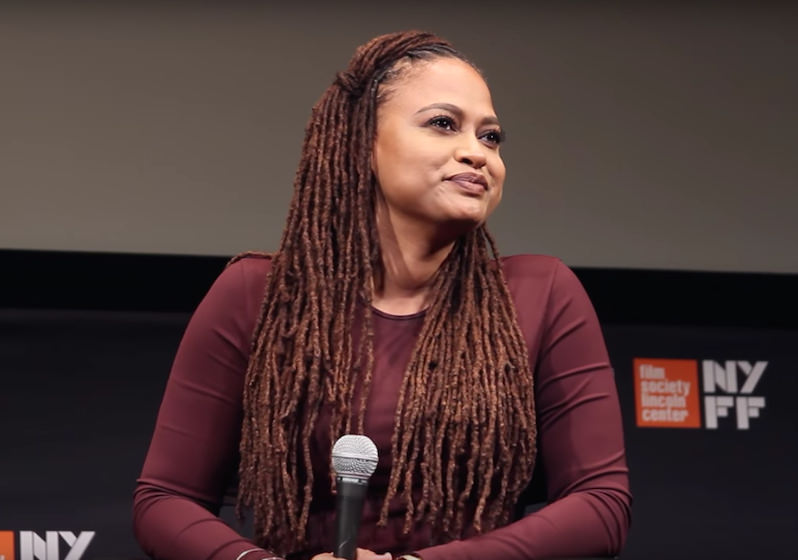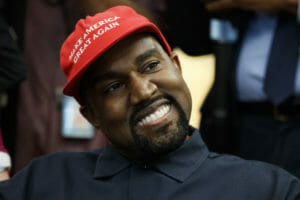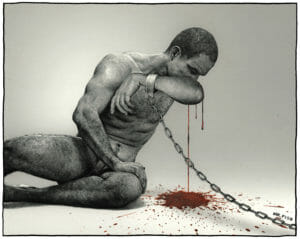Truthdigger of the Week: Ava DuVernay, Activist Filmmaker
Even when off the set, the director of "13th" and "Selma" regularly addresses issues of political injustice.
Ava DuVernay. (Screen shot via YouTube)
Ava DuVernay knows that politically charged art has the power to affect an entire country. The writer, producer and director has spent years in the film industry creating documentaries and dramas, and she made major headlines for her 2014 film, “Selma,” about the 1965 civil rights march from Selma to Montgomery, Ala.
Now, as civil rights in America come under scrutiny, many feel it’s important for artists to speak out on issues of injustice. That’s exactly what DuVernay has done with her latest film, “13th,” a Netflix documentary that explores how the 13th Amendment is responsible for mass incarceration in the United States today.
“The whole film is a virtual tour through racism,” she told The Atlantic in October. “We’re giving you 150 years of oppression in 100 minutes. The film was 150 years in the making.”
Although “13th” has been out now for several months, DuVernay is continuing to talk about the content of the film—particularly in the wake of Donald Trump’s presidential victory. She regularly speaks out on issues of social justice on her Twitter account, and two interviews published this week are reminders of DuVernay’s activist views.
DuVernay hopes her art will have a political effect on audiences. “The ideas that Trump is talking about are deeply embedded in the documentary,” she told Esquire in an interview published Tuesday.
She continued:
I hope, among many other things, people walk away from “13th” with a recognition of the pattern, the cycle, and the fact we’re in another one. It can feel like we’re in a moment that is completely new and never experienced before, unless we look to the past and understand the context within which we’re currently living, the context by which we find ourselves with a President Trump—which is hard for me to even say at this point. It’s wildly important, and it’s not done hardly enough, that we look back—and not just tip our hats, but really look back and understand, dig into it, unfold the layers of history so that we can live more deeply in the present.
DuVernay does not shy away from speaking up about political injustice, even if it doesn’t always pertain to her filmmaking. In an interview with Variety published Thursday, DuVernay was candid about her feelings toward Trump’s upcoming inauguration.
“The power of the image is one that we all know as people who know film and practice film,” DuVernay said. “It’s a striking, emotional thing. And when he lifts his hand, puts his hand on that Bible and takes the oath, when we see the image, I pray that that is the thing that shakes us out of the stupor. Because then it’s done. I’m dreading the image. But it’s coming. It is real.”
DuVernay included material about Trump in “13th” and this clip from the documentary went viral late last year:
“In the good ol’ days…” #13TH pic.twitter.com/2IzF87ODP6
— 13TH (@13THFilm) October 12, 2016
“Take him out? Leave him in? No, he doesn’t deserve a place in this thing,” DuVernay said of Trump at a screening of the documentary last year. “But you gotta show that stuff because it’s too important and it can’t be forgotten. I think it’s vital to have him in there, because he’s taken this country to a place that is going to be studied and considered for a long time.”
“He’s addressed his views about it. He’s addressed a lack of empathy for imprisoned and incarcerated people,” DuVernay said at another screening in Los Angeles shortly after the election. “He’s talked about the industry around it. He’s ‘very good at business,’ and he feels that it’s a business. Stocks for the private prison industry rose by over 50 percent the day after his election. So folks are betting on the fact that he will not just continue but increase that part of the business.”
But as the reality of a Trump administration has sunk in, DuVernay refuses to sink into despair. Instead, she has expressed hope about increasing activism and unity among those who oppose many of Trump’s values.
“These are dark times for a lot of people who believe differently than our incoming administration, but there’s also joy there, and there’s also something in unifying around the things that we do believe in,” she told Deadline at the end of 2016.
She expanded on the sentiment in this week’s interview with Esquire. “I think there’s a good base of knowledge of what we’re opposing, but I think there’s going to be all kinds of new surprises, and I think people who are maybe apathetic to everything now will find themselves feeling agitated by what will happen,” DuVernay said.
“I automatically know what I’m opposing because the president[-elect] opposes my very existence and everything I stand for, so right there that’s a really clear response,” she continued. “But I think that there are folks who feel like they are usually on the inside of it, or have the privilege of not focusing on these things, who will be affected.”
This week isn’t the first time DuVernay has been outspoken about important issues—she has long addressed injustices within the film industry, as well as problems afflicting the nation as a whole.
In 2015, as “Selma” was beginning to receive critical acclaim, DuVernay used her newfound success to discuss race and gender in interviews with popular entertainment outlets.
For example, she told The Hollywood Reporter in November 2015 that her biggest frustration with Hollywood was “[t]hat only 4 percent of studio directors are women.”
Around the same time, she explained how the shooting in Ferguson and the Black Lives Matter movement actively influenced her work. “Michael Brown was murdered while I was in the editing room for ‘Selma’, so watching [the news] and watching all the coverage in Ferguson influenced the way I was cutting,” she told NBC News.
“For there only to be one dominant voice determining what’s said and saying it is something that all like-minded people who believe in dignity of everyone should be concerned about. That comes into play for women and for people of color,” she said in her interview with The Hollywood Reporter. “It’s not a problem that can be fixed by the word ‘diversity,’ whatever that means. It’s a problem that’s going to take a multipronged solution and allies all over the place who say, ‘We want to make a change.’ “
“Any film that you see that has any progressive spirits that is made by any people of color or a woman is a triumph, in and of itself,” she said in her NBC News interview, noting that the statistics “are dismal when it comes to women filmmakers, even worse, horrible, horrific when it comes to women-of-color filmmakers.”
DuVernay’s current and future work also reflect her progressive ideals. She currently is directing a film version of the award-winning science fantasy classic “A Wrinkle in Time” and is the creator and executive producer of the television show “Queen Sugar.”
“If have the opportunity to do a television show, I want to make something like ‘Queen Sugar’ where it’s a family drama that chronicles the current Black Lives Matter moment and what that means, and have a formerly incarcerated main character,” she told Esquire. “If I’m doing a Disney movie, I want to do a film that has something to say, a film that is a cross between social commentary and spirituality and science, and that’s ‘A Wrinkle in Time.’ I just approach it all from a place of my own interests and exercising my voice.”
At a time when many Americans are using movies as relief from political chaos, DuVernay is staunchly refusing to make comfortably entertaining films. She allows contemporary politics to influence her work, and she in turn affects the country with her art.
“13th” already has won numerous awards, has been nominated for The Humanitas Prize and is generating Oscar buzz.
DuVernay’s two interviews this week prove she isn’t done fighting for justice, despite the success of “13th” and her growing Hollywood career. She continues to encourage her fans to engage in political activism and fight against regressive politics.
For her work breaking down barriers and shining a light on injustice both inside and outside the film industry, Ava DuVernay is our Truthdigger of the Week.
Independent journalism is under threat and overshadowed by heavily funded mainstream media.
You can help level the playing field. Become a member.
Your tax-deductible contribution keeps us digging beneath the headlines to give you thought-provoking, investigative reporting and analysis that unearths what's really happening- without compromise.
Give today to support our courageous, independent journalists.





You need to be a supporter to comment.
There are currently no responses to this article.
Be the first to respond.